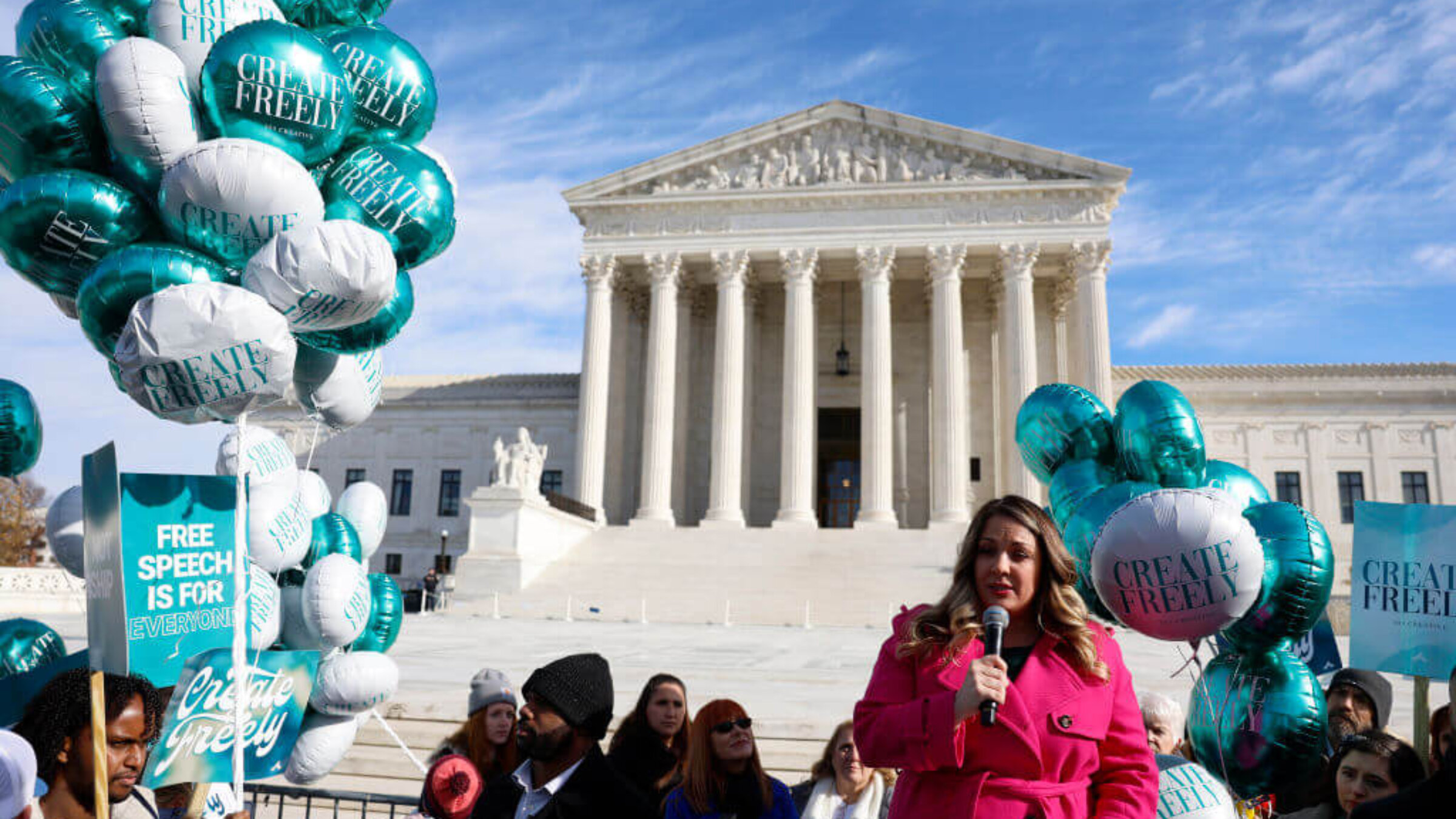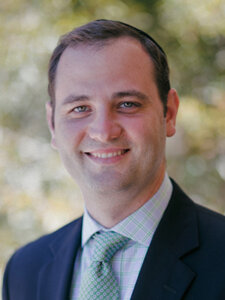Free speech or discrimination? SCOTUS hears the case of a web designer refusing to work with same-sex couples
Only 4 years after the “baker case,” another Colorado resident claims providing services to LGBTQ couples violates her rights

Lorie Smith, the owner of 303 Creative, a website design company in Colorado, speaks with supporters outside of the U.S. Supreme Court Building on December 05, 2022 in Washington, DC. Photo by Anna Moneymaker/Getty Images
If you felt a strong sense of deja vu watching the Supreme Court’s oral argument on Dec. 5, it would be hard to blame you.
On the docket, once again, was a case of a Colorado business that refused to provide its services to same-sex couples. This time, instead of a baker refusing to bake a wedding cake, it’s a web designer refusing to create a wedding website.
In taking on 303 Creative v. Elenis, however, the Court chose to limit its inquiry to the free speech questions raised by the case, leaving to the side questions of religious liberty. As a result, the question presented by the case is whether a website designer, once she begins designing wedding websites for all couples, refuse to design wedding websites for same-sex couples?
The fact that the Court is revisiting this issue just four years after deciding the so-called “baker case” is the result of the narrowness of its prior decision. The Court ultimately resolved Masterpiece Cakeshop v. Colorado Civil Rights Commission without delving into questions of free speech and with good reason. The factual record in the case was somewhat muddled as to exactly what kind of cake the baker refused to bake -– was it a generic case with little expressive content or was it a custom-designed cake aimed at expressing some sort of speech-like message?
The Court’s majority sidestepped these issues in resolving the baker’s claims by holding that the Colorado Civil Rights Commission had unconstitutionally denigrated his religious convictions. Because the decision focused on the specifics of how the baker’s claims were adjudicated — as opposed to the underlying substance of the issues — the Court gave us previous little on how to resolve clashes between anti-discrimination laws and the First Amendment.
Enter Lorie Smith, owner of 303 Creative, a website designer in Colorado who believes that marriage can only be between a man and woman. Colorado prohibits places of “public accommodation” — loosely defined as businesses open to the public — from discriminating on the basis of sexual orientation in the provision of services. Failure to comply with these anti-discrimination laws can lead to significant fines. In order to avoid potential liability, Smith has not offered any customers wedding websites. Because if she did, she would not be willing to do for same-sex couples.
Here we see another important difference between the two cases. The trigger for the baker case was the baker’s actual refusal to bake a cake for a same-sex couple celebrating their marriage. But Smith, presumably concerned about the prospect of liability, filed suit before opening for wedding-website business. She argued, among other things, that Colorado’s rule was threatening her free speech rights by preventing her from expanding without choosing between building a website that conveyed a message she didn’t believe or facing financial penalties for violating Colorado anti-discrimination law.
The most essential question underlying 303 Creative’s free speech claims is whether making this sort of wedding website ought to be considered speech. If it is speech, then a law requiring someone to design a particular wedding website, under threat of financial penalty, would presumably run afoul of the “compelled speech” doctrine. The First Amendment provides some of its most robust protections against laws that would require citizens to speak a message contrary to their conscience. Indeed, in one of its most famous declarations, the Supreme Court stated “If there is any fixed star in our constitutional constellation, it is that no official, high or petty, can prescribe what shall be orthodox in politics, nationalism, religion, or other matters of opinion or force citizens to confess by word or act their faith therein.”
In many cases, figuring out whether something is sufficiently expressive to be speech — and therefore protected from compelled speech — is a hotly debated issue. In 1995, an Irish LGBTQ group was denied permission to participate in a privately organized St. Patrick’s Day Parade in Boston. The LGBTQ group filed suit under state anti-discrimination law, but the Supreme Court held that the parade organizers had a First Amendment right to exclude the group; to do otherwise, the Court held, would amount to unconstitutional compelled speech because forcing the organizers to include the LGBTQ group would “alter the expressive content of their parade.”
On the other side of the spectrum, the Supreme Court addressed in a 2006 opinion the Solomon Amendment — a federal law that withheld federal funding to universities that failed to provide U.S. military recruiters the same access to students as provided to other prospective employers. When an association of law schools and law faculties challenged the rule on free speech grounds, a unanimous Supreme Court rejected the claim because compliance with the Solomon Amendment wasn’t expressive. In the words of the Court, allowing recruiters on campus “affects what law schools must do . . . not what they may or may not say.”
The difficulties in figuring out when conduct is sufficiently expressive to qualify as speech — and therefore for the protections afforded compelled speech — is why oral argument this week amounted to nearly two hours of questions from the justices, often addressing some relatively outlandish scenarios.
Given the context-sensitive nature of the inquiry, the justices all wondered about the implications of the case before them. For example, Justice Sotomayor wanted to know whether a decision in favor of 303 Creative would also permit a website designer to object to creating a wedding website for an interracial marriage (the answer would appear to be yes). And Justice Alito wanted to know whether a decision against 303 Creative would also prohibit a Jewish web designer from refusing to design a wedding page for an interfaith couple (the answer would also appear to be yes).
But while this sort of inquiry might normally be quite challenging, the current case may have less than meets the eye. As a number of justices noted, what makes this case somewhat unique is that 303 Creative hasn’t launched its wedding website services yet and therefore hasn’t actually denied service to anybody yet.
If all parties agree creating the website and graphics are expressive, then creating wedding websites is a form of speech, and requiring 303 Creative to make such a website for a same-sex couple would amount to compelling speech in violation of the First Amendment.
Where does this leave us? It might mean we’ll end up with a relatively narrow opinion. During oral argument, the attorney for 303 Creative, Kristen Waggoner, agreed that various other kinds of vendors — such as hairstylists, caterers, tailors, jewelers and restaurants — would not typically have First Amendment rights as they provide an active service, not a type of expressive speech, and therefore could not refuse service for same-sex weddings on free speech grounds. Waggoner also conceded that companies selling off-the-rack web templates, where customers simply buy them and then input their own text and materials, also don’t have free speech protections because the company isn’t doing anything expressive — only the customer is.
It’s only in this unique situation — where you have a sufficiently custom product that both parties agree is expressive, like artwork — that a business could refuse, on First Amendment grounds, to make a wedding website for a same-sex couple.
Justice Kagan indicated that her view roughly tracked this sort of argument. She criticized arguments that would extend free speech logic to cases where a wedding website lacked any significant expressive content and just included a “schedule of events,” “travel and hotel arrangements,” “favorite things to do in town,” and a “registry.” By contrast, if each wedding website had some sort of expressive content, such as “God bless this union,” Justice Kagan intimated that requiring a web designer to make such a website for a same-sex couple could very well implicate free speech concerns.
To be sure, this isn’t to say such a result wouldn’t have real impact. When it comes to questions of religious discrimination, for example, web designers and artists who make custom – and expressive – products could potentially refuse to sell services on the basis of religious affiliation. A Christian web designer could potentially refuse to make a wedding website for Jews, or a Jewish web designer could refuse to make a wedding website for an interfaith couple.
But, in the general run of cases, where the parties are likely to hotly contest whether provision of wedding services and products are expressive, there may be good reason to wonder whether the Court’s opinion will apply. No doubt, such an opinion would be significant.
303 Creative v. Elenis does not blow open the door for First Amendment claims, and still leaves space for anti-discrimination laws to effectively protect marginalized Americans.
To contact the author, email [email protected].
























